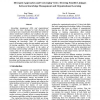Free Online Productivity Tools
i2Speak
i2Symbol
i2OCR
iTex2Img
iWeb2Print
iWeb2Shot
i2Type
iPdf2Split
iPdf2Merge
i2Bopomofo
i2Arabic
i2Style
i2Image
i2PDF
iLatex2Rtf
Sci2ools
170
click to vote
HICSS
2003
IEEE
2003
IEEE
Divergent Approaches and Converging Views: Drawing Sensible Linkages between Knowledge Management and Organizational Learning
Knowledge management (KM) and organizational learning (OL) have developed in both divergent and convergent ways. In particular, these fields have relatively distinct intellectual traditions and conditions that gave rise to disciplines, as well as a certain level of disparity in research focus and view of knowledge. For example, KM focuses more on the content of knowledge and products of managing the knowledge, while OL emphasizes the process of meaning creation, decision making, and growth of learning capability. The two literatures also reveal, however, convergences with regard to the nature of knowledge and knowledge sharing in the organizational context. Thus the two fields have started to establish a consolidated view of knowledge, in which knowledge is related to practice and situated in the historical, social, and cultural context where it is created and acquired. In addition, both fields recognize the multi-level nature of knowledge and learning and are striving to bridge the g...
Biometrics | Distinct Intellectual Traditions | HICSS 2003 | Knowledge Management | Knowledge Sharing | System Sciences |
| Added | 04 Jul 2010 |
| Updated | 04 Jul 2010 |
| Type | Conference |
| Year | 2003 |
| Where | HICSS |
| Authors | Jing Zhang, Sue R. Faerman |
Comments (0)

